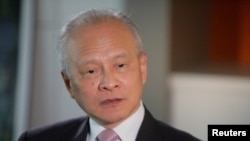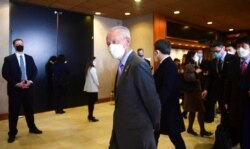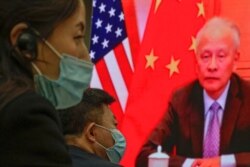Cui Tiankai, the 69-year-old career diplomat who has served as China’s ambassador to the United States since April 2013, is getting ready to go home.
American analysts mostly give Cui high marks for how he represented his country — or at least its government — during his eight-year tenure. But they also question the degree to which he or any Chinese diplomat has been able to influence decision-making in Beijing.
Winston Lord, former U.S. ambassador to China, and Bonnie Glaser, director of the Asia Program at the German Marshall Fund in Washington, are among those who say Cui has been a highly effective diplomat.
“Ambassador Cui Tiankai has done an outstanding job in my view, during a very difficult period,” Lord said in a phone interview from his home in New York.
Skilled, respected
The fact that Cui remained in his post for so long attests to his skill and the respect in which he is held, Lord said. “He’s been very strong in defending Chinese interests, of course, but he’s always done so with a sense of trying to encourage some sort of dialogue, even though we’ve got some sharp disagreements.”
Glaser attended some events Cui hosted at the Chinese Embassy. When asked about the senior diplomat’s mannerisms at those functions, she recalled that “sometimes he was gracious, sometimes he used tougher language when that was appropriate — he’s a very good diplomat, and he adjusts his messaging based on the prevailing situation in the U.S.-China relationship.”
When Cui took up his post, he spoke of China as the “largest developing country” and the U.S. as “the largest developed one.” He said the relationship was driven by “the ever-expanding converging interests between our two countries and the common responsibility that we share in safeguarding world peace, promoting sustainable development of the global economy.”
Eight years later, relations between the two countries have reached their lowest ebb in decades as Beijing adopts a more aggressive posture around the world — sending out a new breed of diplomats described as “wolf warriors.”
“Even though people would admire [China’s] economic progress, the wolf warrior approach to diplomacy, the repression at home, [hostile] actions abroad have meant a decline in how China is viewed around the world,” Lord said.
However, neither he nor Glaser sees Cui as part of that new breed.
Three responsibilities
Traditionally, ambassadors have three main responsibilities, “no matter which country you represent,” Lord said in the phone interview. In addition to representing the home country and its interests, an ambassador is tasked with reporting on developments in the host country and making policy recommendations.
A Chinese ambassador in Washington is expected to give officials in Beijing “a real feel for the American scene; that’s very important,” said Lord. But, he added, it may be difficult for Cui or any Chinese diplomat to be entirely candid.
“I think the American ambassador has a somewhat easier time than the Chinese ambassador,” he said. “If our ambassador sends home frank views — for example, disagreeing with what Washington is doing, or perhaps saying that the Chinese point of view is reasonable — that will be respected; he’s expected to be candid. He shouldn’t need be overly belligerent or overly rosy in his views of his host country. All he’s got to do is be honest.”
The Chinese ambassadors, meanwhile, “probably are going to have a more difficult time,” he said. “It’s a lot more difficult politically for the [Chinese] ambassador here to go back to Beijing and say, ‘Look, you’re making a mistake,’ or that the American point of view is not unreasonable.”
David Stilwell, who served as the U.S. assistant secretary of state for the Bureau of East Asian and Pacific Affairs from June 2019 until January, said Cui’s dilemma has its roots in the political culture in Beijing.
“I feel sorry for Ambassador Cui; he’s been between a rock and a hard place for the last eight years,” Stilwell said in a phone interview from Honolulu. “As the man on the ground in D.C., he was responsible for telling Beijing what to expect from the new administration.” Stilwell was referring to hardened stance towards the Chinese government adopted by the administration led by President Donald Trump.
Criticism 'not tolerated'
However, “suggesting that General Secretary Xi [Jinping] needed to change course, to compromise, would be tantamount to criticism,” Stilwell continued. “In the cult of personality that surrounds Xi Jinping, criticism is not tolerated.”
Stilwell said that he imagined “Cui saw the train wreck that was coming but couldn’t do anything to stop it, nor could he get out of the way.” By “train wreck,” Stilwell said he was referring to the perception in Beijing of the drastic downturn in bilateral relations.
“From where I sat, it was long overdue course correction,” he said.












